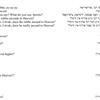5: Cantata excerpt, Maurice Rauch and Itche Goldberg’s “Oyb nit nokh hekher,” Yiddish, ca. 1940s-60s, English translation, 2020, and musical recording, 2000.
Maurice Rauch composed the music and Itche Goldberg wrote the libretto for this cantata based on Peretz’s story. (Sholom Secunda, the writer of the famous Yiddish song “Bay mir bistu sheyn”—“To Me You’re Beautiful”—also wrote a cantata based on the story, but in English.) Like the radio play in Resource 3 of this kit, this concluding excerpt of Rauch and Goldberg’s piece imagines a dialogue that does not appear in the short story: here, the Hasidim (sung in this 2000 recording by the Choral Society of Southern California and the Los Angeles Zimriyah Chorale) tease the Litvak (sung by the cantor Ira Biegeleisen) and insist he tell them where the rebbe goes if not to Heaven. The Litvak gives them his titular response, and the two parties harmonize on the concluding lines in apparent agreement.
The two creators of the cantata were both born in Eastern Europe and, like Peretz (whose funeral Goldberg attended in Warsaw at age 13), believed in the value of Yiddish language and culture as a vehicle for a secular and humanistic, but still spiritually informed, Jewish practice.
Though this outlook informed their writing of the cantata, which was premiered by the Jewish People’s Philharmonic Chorus in New York (conducted by Rauch for many years), the piece was denied a performance by a sister chorus in Detroit aligned with the International Workers Order, or as it was known in Yiddish, the “Ordn” (“Order”). The Detroit administrators of the branch, when they learned that the piece had been scheduled, rejected it on the grounds that the piece depicts a Hasidic rebbe and the practice of traditional Judaism, while their organization was progressive and staunchly secular. Goldberg, because he so believed in the work’s message of beneficence toward one’s fellow man being even “higher” than pure religion or devotion to God, traveled to Detroit at his own expense to win over the Ordn administrators. Not only does the rebbe achieve something “higher” than religion through doing good works, Goldberg argued, but Hasidism itself was begun as a movement of common people, not unlike socialism. His efforts were successful, and the committee’s decision was reversed.
Suggested Activity: Play the excerpt for the students and have them follow along with the text provided, which contains the Yiddish alongside an English translation. Ask them how this composition changes Peretz’s ending, in terms of both mood and plot. What happens here that does not happen in Peretz’s story?
In the story, the Litvak becomes a disciple of the rebbe, and quietly adds “If not higher!” whenever a Hasid brings up the miracle of the rebbe ascending to Heaven. In this cantata, the Litvak is taunted and called a “tseylem-kop”—literally “crucifix-head,” connoting a heretical person—and answers by proudly proclaiming his new philosophy to the entire assembly of Hasidim. After initially doubting his answer, the Hasidim end by ardently chorusing “If not higher!” together with him.
What effect does the ending of the cantata have on the narrative and its message? Does it feel like propaganda, with all of the Jews coming to the same conclusion as the Litvak, and being changed by his new philosophy? Is such a strong social imperative evident in Peretz’s original story, as well?
Rauch’s composition fits comfortably into the category of classical choral-dramatic works. Ask students: if they were to set Peretz’s story to music, what genre would they choose and why? How might their choice of style influence or change the story, its characterizations, and its moral? Might they choose a genre that would hold greater appeal for their age group and their era, as Rauch’s classical idiom might have done for his mid-century adult listeners? What relevance might this story hold for today’s readers anyhow?
Sources: Maurice Rauch and Itche Goldberg, “Oyb nit nokh hekher,” ca. 1940s–60s, recorded for the Milken Archive of Jewish Music, vol. 12, album 2, “Legend of Toil and Celebration: Songs of Solidarity, Social Awareness, and Yiddish Americana” (Santa Monica, CA: Milken Archive Digital, recorded 2000, released 2013), track 1. ©Milken Family Foundation, courtesy of the Milken Archive of Jewish Music.
Itche Goldberg, “Oyb nit nokh hekher,” trans. Mikhl Yashinsky (New York: 2020).
5_Cantata_text_with_translation.jpg
 Download image (299.45 KB)
Download image (299.45 KB) 5_Cantata_conclusion.mp3
 Download audio (2.14 MB)
Download audio (2.14 MB)

